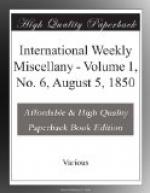* * * * *
“Miss Fuller was at one time editor, or one of the editors of the ‘The Dial,’ to which she contributed many of the most forcible and certainly some of the most peculiar papers. She is known, too, by ‘Summer on the Lakes,’ a remarkable assemblage of sketches, issued in 1844, by Little & Brown, of Boston. More lately she published ‘Woman in the Nineteenth Century,’ a work which has occasioned much discussion, having had the good fortune to be warmly abused and chivalrously defended. For ‘The New York Tribune,’ she has furnished a great variety of matter, chiefly notices of new books, etc., etc., her articles being designated by an asterisk. Two of the best of them were a review of Professor Longfellow’s late magnificent edition of his own works, (with a portrait,) and an appeal to the public in behalf of her friend Harro Harring. The review did her infinite credit; it was frank, candid, independent—in even ludicrous contrast to the usual mere glorifications of the day, giving honor only where honor was due, yet evincing the most thorough capacity to appreciate and the most sincere intention to place in the fairest light the real and idiosyncratic merits of the poet. In my opinion it is one of the very few reviews of Longfellow’s poems, ever published in America, of which the critics have not had abundant reason to be ashamed. Mr. Longfellow is entitled to a certain and very distinguished rank among the poets of his country, but that country is disgraced by the evident toadyism which would award to his social position and influence, to his fine paper and large type, to his morocco binding and gilt edges, to his flattering portrait of himself, and to the illustrations of his poems by Huntingdon, that amount of indiscriminate approbation which neither could nor would have been given to the poems themselves. The defense of Harro Harring, or rather the philippic against those who were doing him wrong, was one of the most eloquent and well-put articles I have ever yet seen in a newspaper.
“‘Woman in the Nineteenth Century’ is a book which few women in the country could have written, and no woman in the country would have published, with the exception of Miss Fuller. In the way of independence, of unmitigated radicalism, it is one of the ’Curiosities of American Literature,’ and Doctor Griswold should include it in his book. I need scarcely say that the essay is nervous, forcible, suggestive, brilliant, and to a certain extent scholar-like—for all that Miss Fuller produces is entitled to these epithets—but I must say that the conclusions reached are only in part my own. Not that they are bold, by any means—too novel, too startling or too dangerous in their consequences, but that in their attainment too many premises have been distorted, and too many analogical inferences left altogether out of sight. I mean to say that the intention of the Deity as regards sexual differences—an




